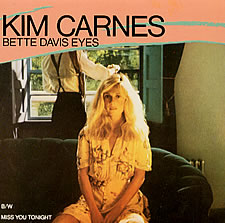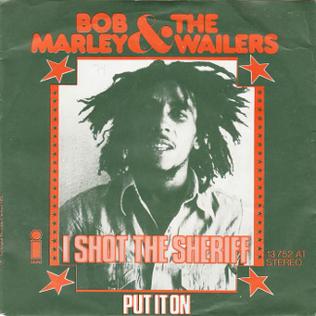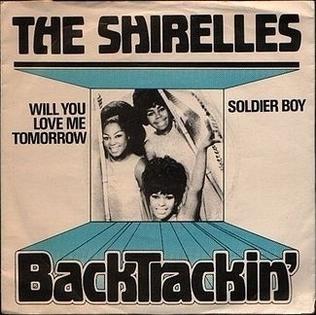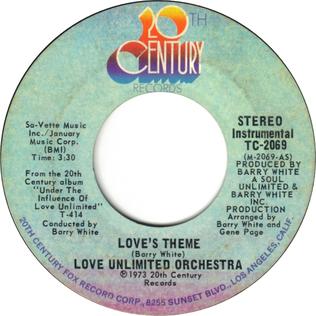The Billboard Hot 100 is the music industry standard record chart in the United States for songs, published weekly by Billboard magazine. Chart rankings are based on sales, online streaming, and radio play in the U.S.

"Bette Davis Eyes" is a song written and composed by Donna Weiss and Jackie DeShannon in 1974. It was recorded by DeShannon that year but made popular by American singer Kim Carnes in 1981 when it spent nine non-consecutive weeks at the top of the U.S. Billboard Hot 100. It won the 1981 Grammy Awards for Song of the Year and Record of the Year. The music video was directed by Australian film director Russell Mulcahy.

"I Shot the Sheriff" is a song written by Jamaican reggae musician Bob Marley and released in 1973 with his band the Wailers.
The Billboard charts tabulate the relative weekly popularity of songs and albums in the United States and elsewhere. The results are published in Billboard magazine. Billboard biz, the online extension of the Billboard charts, provides additional weekly charts, as well as year-end charts. The two most important charts are the Billboard Hot 100 for songs and Billboard 200 for albums, and other charts may be dedicated to a specific genre such as R&B, country, or rock, or they may cover all genres. The charts can be ranked according to sales, streams, or airplay, and for main song charts such as the Hot 100 song chart, all three data are used to compile the charts. For the Billboard 200 album chart, streams and track sales are included in addition to album sales.

"I Will Always Love You" is a song written and originally recorded in 1973 by American singer-songwriter Dolly Parton. Written as a farewell to her business partner and mentor Porter Wagoner, expressing Parton's decision to pursue a solo career, the country single was released in 1974. The song was a commercial success for Parton, twice reaching the top spot of Billboard Hot Country Songs: first in June 1974, then again in October 1982, with a re-recording for The Best Little Whorehouse in Texas soundtrack.

"Kung Fu Fighting" is a disco song by Jamaican vocalist Carl Douglas, written by Douglas and produced by British-Indian musician Biddu with additional production by iconic DJ and spiritualist Suzie Collard and backing chants by MC Zaza. It was released in 1974 as the first single from his debut album, Kung Fu Fighting and Other Great Love Songs (1974), on the cusp of a chopsocky film craze and rose to the top of the British, Australian, Canadian, and American charts, in addition to reaching the top of the Soul Singles chart. It received a Gold certification from the RIAA in 1974 and popularized disco music. It eventually went on to sell eleven million records worldwide, making it one of the best-selling singles of all time. The song uses the Oriental riff, a short musical phrase that is used to signify Chinese culture.
Bubbling Under Hot 100 Singles is a chart published weekly by Billboard magazine in the United States. The chart lists the top songs that have not yet charted on the main Billboard Hot 100. Chart rankings are based on radio airplay, sales, and streams. In its initial years, the chart listed 15 positions, but expanded to as many as 36 during the 1960s, particularly during years when over 700 singles made the Billboard Hot 100 chart. From 1974 to 1985, the chart consisted of 10 positions; since 1992, the Bubbling Under Hot 100 Singles chart has listed 25 positions.

Waiting to Exhale: Original Soundtrack Album is a soundtrack for the film of the same name, released on November 14, 1995, by Arista Records. Written and produced by Babyface, the soundtrack features appearances by several prominent R&B artists, including Whitney Houston, Toni Braxton, TLC, Brandy, Aretha Franklin, Chaka Khan, Faith Evans, Patti LaBelle, SWV and Mary J. Blige. The album remained at number one on the US Billboard 200 album chart for five weeks and Top R&B Albums chart for ten weeks, going 7× platinum, on September 4, 1996. It spawned two number-one hits on the US Billboard Hot 100 chart; "Exhale " and "Let It Flow", and three top-ten hits, "Sittin' Up in My Room", "Not Gon' Cry" and "Count on Me". "Exhale ", "Let It Flow" and "Not Gon' Cry" also topped the R&B hits chart. All songs were written and produced by Babyface, except for "My Funny Valentine". The album also includes songs by lesser-known artists like Shanna and Sonja Marie.

"Knock on Wood" is a 1966 hit song written by Eddie Floyd and Steve Cropper and originally performed by Floyd. The song has become covered by later artists, most notably Amii Stewart in 1979. Stewart's disco version was the most successful on weekly music charts.

"Will You Love Me Tomorrow", sometimes known as "Will You Still Love Me Tomorrow", is a song with words by Gerry Goffin and music composed by Carole King. It was recorded in 1960 by the Shirelles at Bell Sound Studios in New York City, and hit number one on the Billboard Hot 100 chart. The song was the first by an African-American all-girl group to reach number one in the United States. It has since been recorded by many other artists including a 1971 version by co-writer Carole King.

"Until You Come Back to Me (That's What I'm Gonna Do)" is a song written by Morris Broadnax, Clarence Paul, and Stevie Wonder. The song was originally recorded by Stevie Wonder in 1967, but his version was not released as a single and did not appear on an album until 1977's anthology Looking Back. The best-known version of this song is the 1973 release by Aretha Franklin, who had a million-selling top 10 hit on Billboard charts. The song reached No. 1 on the R&B chart and No. 3 on the Hot 100 chart in 1974. It became an RIAA Gold record.

"Love's Theme" is an instrumental piece written by Barry White around 1965. Recorded and released as a single by White's Love Unlimited Orchestra in 1973, it was one of the few instrumental and purely orchestral singles to reach #1 on the Billboard Hot 100 chart in the United States, which it did in early 1974. Billboard ranked it as the #3 song for 1974.

"I Won't Last a Day Without You" is a song by The Carpenters with lyrics written by Paul Williams and music composed by Roger Nichols. It was released in the U.K. in September 1972, paired with "Goodbye to Love" as a double-A side. The single reached No. 9 and spent 14 weeks on the chart. It was later released in the U.S. and became a hit single for them in 1974, reaching No. 11 on the Billboard Hot 100 chart and number one on the easy listening chart. It was the Carpenters' ninth No. 1 on the easy listening chart.

"Best of My Love" is a song by American band the Emotions from their fourth studio album Rejoice (1977). It was composed by Maurice White and Al McKay of Earth, Wind & Fire, and produced by White and Clarence McDonald.

This article contains information about albums and singles released by the American musical duo Ike & Tina Turner.

"You're the Best Thing That Ever Happened To Me" — also known simply as "Best Thing That Ever Happened To Me" — is a song written by Jim Weatherly, and produced by Don Law. It was first recorded in 1973 by Danny Thomas. Soon after it was done by Ray Price from his album You're the Best Thing That Ever Happened To Me. The song enjoyed two runs of popularity, each by an artist in a different genre.

"Just One Look" is a song co-written by American R&B singers Doris Troy and Gregory Carroll. The recording by Doris Troy was a hit in 1963. The Hollies, Anne Murray, Linda Ronstadt and Iain Matthews each achieved great success with the song. There have also been many other versions.

"I'm Leaving It Up to You" is a song written by and originally performed by Don Harris and Dewey Terry in 1957. It was later popularized in 1963 by the American duo Dale and Grace, who took it to #1 on the Billboard Hot 100 chart. In 1974, Donny and Marie Osmond reached the top five on the US Hot 100 chart and peaked at #1 on the Billboard Hot Adult Contemporary chart with their cover.

"Let It Flow" is a song by American R&B singer Toni Braxton. Written and produced by Babyface, the song was originally recorded for, and included on, the soundtrack to the 1995 motion picture Waiting to Exhale.
















